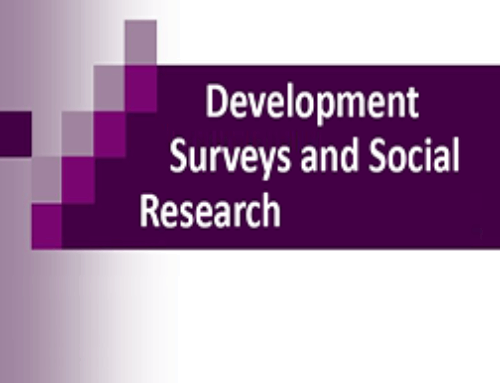IFC NEPAL. MONITORING AND EVALUATION OF THE “PROMOTING CLIMATE RESILIENT AGRIBUSINESS PROJECT, NEPAL” 2013-2018
Climate Change is expected to affect agricultural productivity and based on the weighted average score of critical factors such as vulnerability to climate change, importance to the economy, level of interest among private sector actors, and ease of partnership with producers; three crops – rice, maize, and sugarcane were selected to be the focus of IFC’s advisory intervention. The purpose of this assignment is to evaluate the project’s strategic relevance, effectiveness, impact, long-term sustainability, IFC role, and contribution and efficiency. The evaluation will also employ a quasi-experimental design (that is there will be a set of identified treatment farmers for whom a set of similar (comparison) farmers will be selected based on certain criteria. The assignment includes monitoring a sample (panel) of 3,000 farming households across the 3 crops for a period of 4 years.
RURAL HEALTH AND EDUCATION SERVICES TRUST (RHEST). STOP GIRL TRAFFICKING – BASELINE SURVEY 2016
Rural Health Education Services Trust (RHEST) is a Nepalese non-governmental organization working in the areas of human trafficking prevention, child exploitation, and women’s reproductive health and nutrition. R.H.E.S.T, a national-level non-profit organization is implementing a USAID-funded project for supporting 3,800 vulnerable girls, and 2,508 girls children from five districts in the Mid and Far West including Banke, Bardiya, Kailali, Kanchanpur, and Surkhet and 1,292 from Sindhupalchowk (Earthquake affected district) for 3 years. The baseline study focused on the analysis of 3,800 girls as outlined in the project proposal. This study was used as a measurement to monitor the project progress against the set indicators over the course of the project implementation against the project outputs, outcome, and impact. The study was conducted across the program districts using quantitative and qualitative study tools for which 360 structured interviews, 12 Focused Group Discussions (FGDs), and 60 key informant interviews were undertaken.
THE AMERICAN HIMALAYAN FOUNDATION (AHF). STOP GIRL TRAFFICKING – IMPACT EVALUATION STUDY 2016
30 years ago, Rural Health and Education Services Trust (RHEST) started a trafficking prevention program to stop girls in rural Nepal from being trafficked for sex work, child labor, and early, forced child marriage. In 1997 the American Himalayan Foundation (AHF) started collaborating with RHEST as a funding partner. The SGT Project assists girls in grades one through ten. The Amar program is for girls in grades 11 and 12. The Alumnae program is for girls who have graduated grade 12, or for some reason left the project but remain in touch. The development hypothesis of SGT/AMAR is that girls are less likely to be lured or forced into child marriage, child labor, child trafficking, or unsafe migration if they stay in school if they are aware of the risks of trafficking if they have a trusted network to reach out to in times of trouble, and if their communities are motivated to protect girls from being trafficked. It is further believed that girls are more likely to stay in school if school is not a financial burden to their families if they are given help (coaching and tutoring) to do well academically, and if they, their families, and communities see value in educating girls. The objective of the survey was to design and implement an impact evaluation research spread across 915 girls in the 17 districts supported by RHEST/AMAR program was conducted.
POPULATION MEDIA CENTER. BASELINE STUDY FOR PROGRAMMATIC INTERVENTION ON GIRL’S RIGHTS AND CHILD MARRIAGES 2015-16
Population Media Center-Nepal, a non-profit organization, is broadcasting two radio serial dramas in Nepal. Both dramas address child marriage and other related issues of early pregnancy, maternal health, reproductive rights, girls’ secondary education, and sexual violence against both women and girls. The objective of the survey was to conduct a quantitative survey pre-broadcast to generate baseline information on socioeconomic, demographic, and programmatic indicators that can be used for measuring progress in achieving project objectives and indicators for both dramas. This survey will also evaluate the overall impact of the dramas on the listening audience at the end of the project period. The survey was spread across 1900 households across Nepal.
SAMARTH NMDP. IMPACT ASSESSMENT OF GINGER SUB-SECTOR 2014-15
The specific objective of the impact assessment is to produce robust, credible evidence of the impact the Disease Management Intervention has delivered for poor men and women in the ginger sub‐sector in terms of credible evidence on outreach, net attributable income, and poverty reduction. The assignment includes baseline, mid-line, and endline studies. Samarth-NMDP is a five-year DFID-funded rural market development program that aims to reduce poverty in Nepal by increasing the income of 300,000 smallholder farmers and small–scale entrepreneurs.
IFC-SEDF NEPAL. IMPLEMENTATION OF M&E ACTIVITIES OF IFC-SEDF IN NEPAL 2010-2013
As a requirement of credible and neutral monitoring and evaluation (M&E) was required for the IFC-SEDF program in Nepal, a Solutions Consultant was contracted for monitoring the IFC-SEDF interventions and assessing their outcomes and impacts. The consulting and extended services supported the implementation of the M&E system of the IFC-SEDF to monitor and evaluate the inputs and activities, outputs, outcomes, and impacts of their programs using the agreed-upon evaluation methodologies.
UNFPA/NEPAL. MIDTERM PROJECT REVIEW
Solutions Consultant carried out a mid-term review (MTR) of Delivering Essential Reproductive Health Care for Women, Men, and Adolescents of Mid and Far Western Districts of Nepal through Mobile Reproductive Health Camps, funded by the Danish Government. The mid-term review was carried out across 5 project districts in Nepal and focussed on measuring the project achievements, key issues concerning project implementation, and recommendations to ensure the quality and achievement of project targets.
UNFPA/NEPAL. EVALUATION OF PROJECT ON DELIVERING EMERGENCY REPRODUCTIVE HEALTH SERVICES TO CONFLICT-AFFECTED POPULATIONS
The evaluation study was geared toward assessing the project on delivering reproductive health services to the conflict-affected populations of Nepal funded by the ECHO. The study is being conducted in 3 project districts Bajhang, Bajura, and Jumla.
MAXPRO. EVALUATION OF “SPRINKLES” PROGRAMME, A NUTRITIONAL SUPPLEMENT FOR CHILDREN
The program evaluation was focused on assessing the pilot project of “Sprinkles”, a micronutrient supplement for children across two districts of Nepal. The study looked into the communication aspect of the program, a basic consumer opinion study, and an assessment of the program modalities. The study was expected to provide important inputs for the actual launch of the product across Nepal.
UNICEF/ NEPAL. MID-TERM ASSESSMENT STUDY FOR AVIAN FLU PROGRAMME
The earlier formative research on avian flu provided the basis for formulating the objectives, planning effective communication strategies, designing appropriate messages/materials, and selecting media channels. This mid-term study was geared toward assessing the project on avian flu and its activities, as well as providing new indicators and data after the implementation of the program.
DANIDA-HUGOU. EVALUATION OF INCLUSION AND EMPOWERMENT PROJECTS
The scope of work comprised an evaluation of Inclusion and Empowerment Projects Implemented by Holistic Development Centre (Samagra), Lawyer’s National Campaign against Untouchability (LANCAU), and Nepal Dalit Jagaran Kendra (NDJK). The projects were funded by DanidaHUGOU in Nepal and spread across the central and western Hills and Terai regions of Nepal.
CHEMONICS INTERNATIONAL. YOUTH ACTIVITIES IMPACT ASSESSMENT
Solutions Consultant conducted an impact assessment to determine whether or not the current course being followed by USAID/OTI in targeting youth at the grassroots level is successfully engaging targeted youth in positive peace-building roles. Public Link to Report
UNFPA/ NEPAL. FINAL ASSESSMENT OF ACHIEVEMENTS, EFFECTIVENESS, AND IMPACT OF REPRODUCTIVE HEALTH INITIATIVE FOR YOUTH IN ASIA IN NEPAL
The solutions Consultant conducted the final assessment of achievements, effectiveness, and impact of the Reproductive Health Initiative for Youth in Asia, Nepal Program (RHIYA/Nepal) on behalf of the United Nations Fund for Population Activities (UNFPA). The main objective of the study was to assess the overall achievements, results/impact of the RHIYA Nepal, and provide recommendations for future actions and optimal utilization of experiences and results under the next or upcoming phase of the RHIYA or any similar program on ASRH to produce the final assessment report of the RHIYA Nepal.
EQUAL ACCESS NEPAL/ DIGITAL BROADCAST INITIATIVES. PROGRAM ASSESSMENT (BASELINE AND ENDLINE STUDIES)
Solutions Consultant-Research Works was involved in the assessment of the program through baseline and end-line study of Radio Listeners’ groups established by the Equal Access/ Digital Broadcast Initiative. The general objective of this baseline study was to provide status on key indicators as well as provide measurable indicators to assess the project after completion.
NEPAL FAMILY HEALTH PROGRAM (NFHP). ASSESSMENT OF COFP/C TRAINED PROVIDERS
The solutions Consultant conducted an assessment of Comprehensive Family Planning and Counselling (COFP/C) trained service providers for National Health Training Centre (NHTC) on behalf of the Nepal Family Health Program (NFHP). The main objective of the study was to assess the performance of the quality of care and counseling provided by the COFP/ C trained health personnel. The assessment covered 12 districts spread over 5 development regions of Nepal and included an assessment of 80 health facilities
UNICEF/ NEPAL. ASSESSMENT OF CB-IMCI PROGRAMME IN KASKI AND TANAHU
Solutions Consultant conducted a monitoring and evaluation of Health Facilities and the Health personnel in conjunction with the implementation of the Integrated Management of Child Illness (IMCI) for UNICEF in November-December, 2003. The survey was conducted in the 2 districts of Nepal covering 46 health facilities. The research was focused on the impact assessment of the IMCI in the Kaski district where the IMCI program has been implemented for several years and the current baseline status for Tanahu, where IMCI is yet to be implemented
ENVIRONMENTAL HEALTH PROJECT, NEPAL (EHP/ NEPAL). RAPID ASSESSMENT OF THE KALA-AZAR PROGRAMME
The main purpose of the research study was to rapidly assess the awareness of Kala-azar brought through interventions carried out at VDCs of Dhanusha and Mahottari districts in Nepal. The study helped to determine: the awareness and knowledge level about Kala-azar regarding, signs and symptoms, sandfly as a vector, availability of free treatment and knowledge, attitude, and behavior towards care-seeking.




